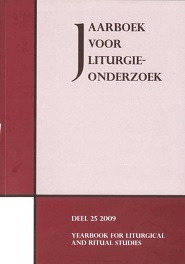Het kerkgebouw als utopische ruimte. 'Katrina', een kerk op theaterfestival Tweetakt
Abstract
In this article, from the works of Henri Lefebvre a spatial approach is developed and applied on the case of ‘Katrina’. This temporary church building was erected on the site of the theatre festival Tweetakt in the historic city centre of Utrecht. From the outside a church recognized by its tower, the wooden building provided for a meeting point, a pub serving meals and a stage for all kinds of theatre and music performances. Although religious symbols and rituals were excluded from the start because the organization intended hospitality, the still so called church was presented as a location of hope and as a centre which made the festival into a coherent whole. Lefebvres concepts of heterotopy and utopy combined with the different aspects he distinguished in the production of space enable to reveal the contested character of this church. Both continuities and discontinuities with traditional perceptions of church buildings and their symbolic potential, turn out to be foundational in the artistic production of social space. Description and analysis of the creation of ‘Katrina’ show that different concepts, experiences and practices contribute to this church being a ‘counterspace’ or even a utopic space: the private is transcended by means of hospitality; the dominant economic order which also affects the world of theatre and festivals, is disrupted by the ideal aspects of the project, including solidarity with the victims of the hurricane ‘Katrina’; local pop bands and performers provided with a public stage in the urban sphere experience that the impossible has become possible. In sum, the creation of the church ‘Katrina’ produces hope and can be characterized as a utopic space.


